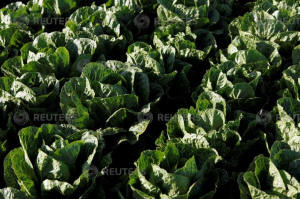|
Abstain from romaine: U.S., Canada warn
on E.coli in lettuce
 Send a link to a friend
Send a link to a friend
 [November 21, 2018]
(Reuters) - Public health officials
in the United States and Canada on Tuesday warned against eating romaine
lettuce while they investigate an outbreak of E. coli that has sickened
50 people in the two countries, including 13 who were hospitalized. [November 21, 2018]
(Reuters) - Public health officials
in the United States and Canada on Tuesday warned against eating romaine
lettuce while they investigate an outbreak of E. coli that has sickened
50 people in the two countries, including 13 who were hospitalized.
The alerts, issued as millions of Americans plan their Thanksgiving Day
menus, covered all forms of romaine, including whole heads, hearts,
bags, mixes and Caesar salad.
Officials were uncertain of the source of the tainted lettuce.
"Consumers who have any type of romaine lettuce in their home should not
eat it and should throw it away, even if some of it was eaten and no one
has gotten sick," the U.S. Centers for Disease Control said in its food
safety alert.
Refrigerator drawers and shelves where romaine lettuce had been stored
should be sanitized, the CDC said.
The Public Health Agency of Canada, which is investigating 18 of the E.
coli cases, directed its romaine lettuce alert at consumers in Ontario
and Quebec.
In the United States, the CDC said the outbreak affected 32 people in 11
states between Oct. 8 and 31. No deaths have been reported, it said.
Symptoms of the infection often include a moderate fever, severe stomach
cramps, vomiting and diarrhea, which is often bloody, the CDC said. Most
people get better in five to seven days, but it can be life-threatening,
it said.
[to top of second column]
|

Romaine lettuce grows near Soledad, California, U.S., May 3, 2017.
REUTERS/Michael Fiala

The agency said the current outbreak is unrelated to another
multi-state rash of E. coli infections related to romaine lettuce
earlier this year that left five people dead and sickened nearly
200.
The U.S. Food and Drug Administration and the CDC traced the origin
of that contamination to irrigation water in the Yuma, Arizona,
growing region.

(Reporting by Peter Szekely in New York; Editing by David Gregorio)
[© 2018 Thomson Reuters. All rights
reserved.]
Copyright 2018 Reuters. All rights reserved. This material may not be published,
broadcast, rewritten or redistributed.
Thompson Reuters is solely responsible for this content. |